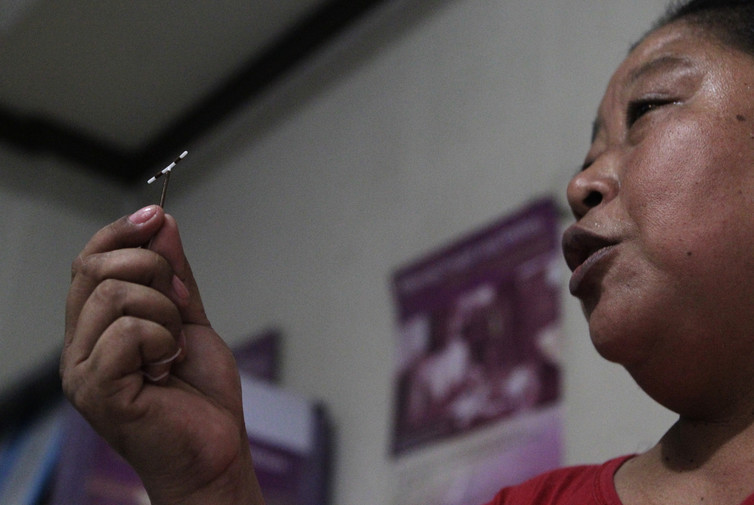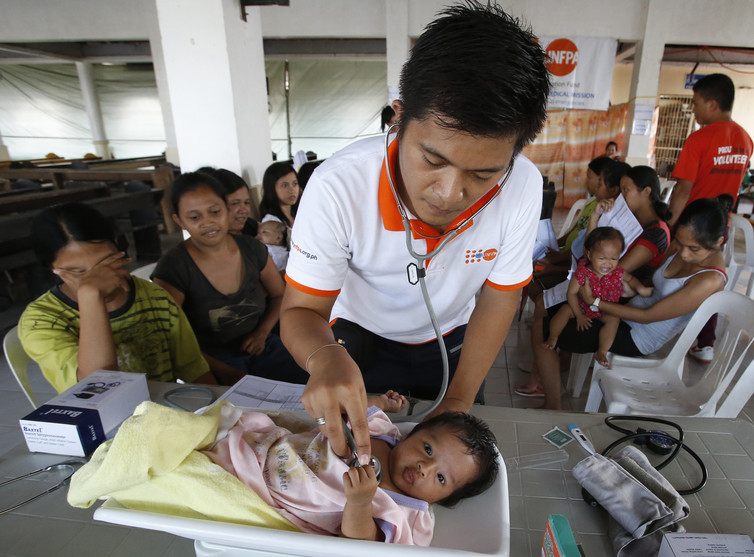As the US Stops Funding UN Reproductive Health Services, China Should Step In
UNITED NATIONS, 24 Apr 2017
Tamara Nair – The Conversation
19 Apr 2017 – On April 4 2017, US President Donald Trump decided to not fund the United Nations Population Fund (UNFPA) in 2018 because of the body’s alleged support for coercive abortions and forced sterilisation in China.
The US is the largest donor to the agency, which mandates access to high-quality sexual and reproductive health services and voluntary family planning. It allows people to make informed and voluntary choices about their sexual and reproductive lives.
US funding totalling US$610 million (including US$35 million for UNFPA) for family planning programs and reproductive health helped prevent 2.4 million abortions in 2015, by averting six million unintended pregnancies.
In 2016, the total amount, which again includes funding for UNFPA, was US$608 million. The US Agency for International Development (US AID) alone has requested US$544 million for family planning and reproductive health for 2017, and the funds cut from UNFPA are expected to be redirected to it.
Hurting the poor
Some of the key areas disrupted by Trump’s extraction of funding include addressing gender-based violence, biomedical and contraceptive research and development, contraceptive supplies and distribution, family planning programs that link HIV/AIDS and sexually transmitted diseases (STD) information and services, post-abortion care, sexual and reproductive health education and the training of health workers.
Without these programs, thousands of infants could have their health compromised as a result of increased high-risk births, especially babies born to adolescent mothers. And couples will lose access to modern contraceptives, which could result in unwanted pregnancies.
A substantial fraction of these unwanted pregnancies could result in illegal, unsafe abortions. What is equally worrying is what the effects of a lack of education and availability of contraceptives might do to efforts toward containing HIV/AIDS and other STDs.
And then there’s the potential stresses on future family and national health budgets because of the lack of information and services for safe termination of pregnancies in the case of Zika babies.
Undermining access to family planning education and services will deny women in poorer countries the tools they need to establish some form of health security within social systems that fail to meet their needs to reproductive and sexual health. The absence of such programs has driven women towards unsafe and illegal abortions, jeopardising their health and resulting in many deaths.
Women’s health in Southeast Asia
In Southeast Asia, the UNFPA and US AID sustain the reproductive and sexual health of women and girls and manage population policies and programs across countries such as Cambodia, Myanmar, Laos, Indonesia, the Philippines and Timor-Leste.
Health budgets in some Southeast Asian countries are extremely strained, as they have to contend with several health challenges. The withdrawal of funding can result in women’s reproductive and sexual health budgets being curtailed, as they might not be priority areas.
The removal of women’s choice in terminating pregnancies is bound to severely strain family incomes in the future (if they have Zika babies, for example). And it can also translate to severely stressed future health expenditures of these countries.
In addition, abortion numbers are unlikely to drop. Rather, we will see the rise of unsafe abortions, one of the leading causes of maternal mortality in the region. So we are in danger of compromising the economic security of families and by extension of these poorer nations because we think it will reduce abortions.
Pregnant adolescent girls, both as a result of early marriage or rape, drop out of school and later, can only gain low-skill jobs. Their income earning potential will be much lower than a young woman who has a minimum ten years of basic numeracy and literacy.
Development goals and human rights
This is a human rights issue and can have great impact on global health security and women’s health. The global community needs to step up to take action to address this deficiency.
The alternative would be to have this failing affect global stability and peace especially in terms of achieving the sustainable development goals – our shared objectives for humanity. All 17 of these require the equal and effective participation of women.

Sexual and reproductive health education is one of the key areas expected to be disrupted by the cuts. Janis Alano/Reuters
The cuts could make Goal 5 for Gender Equality almost impossible to achieve. Target 5.6, for instance, spells out objectives to attain sexual and reproductive health and reproductive rights.
Within this context we need like-minded countries to address this shortfall of US$32.5 million for the UNFPA in the upcoming budget year.
On January 23, Donald Trump signed an executive order reinstating the “global gag rule”, which disallows NGOs from offering abortion services or information about pregnancy termination. It prompted countries such as Norway and the Netherlands to pledge financial assistance to make up for the shortfall so that access to birth control and safe abortions could continue in poorer countries.
Unfortunately, the crisis is too large and the resources too few to have the gap easily filled, especially in light of the recent cuts to UNFPA funds.
But this might be an opportunity for China to help address the global shortage, especially in regions it has close historical and contemporary ties.
Despite continuing human rights problems both domestically and internationally, China has been trying to step up as a responsible global citizen. Consider its commitment to the Paris Agreement and its recent emphasis of renewable energy; its plans to build a national park 60% larger than Yellow Stone National Park to protect the highly endangered Siberian tigers and Amur leopards; and its plan to completely ban the ivory trade by the end of 2017.
Perhaps the rising superpower can help establish equal access for health and well-being in some of the poorer regions in the world: African states where it has vested interests, and Southeast Asia, where it has economic interests and historical ties as well.
China seems to be weaving the narrative of a soft power, as opposed to the hard stance of the US. Whether intentional or otherwise, it is fast gaining kudos and international respect. Adding the feather of global health security to its good international citizen hat would certainly help garner more respect in the international community
________________________________________
Tamara Nair – Research Fellow in Non-Traditional Security Studies at RSIS, Nanyang Technological University.
Republish our articles for free, online or in print, under Creative Commons license.
Go to Original – theconversation.com
DISCLAIMER: The statements, views and opinions expressed in pieces republished here are solely those of the authors and do not necessarily represent those of TMS. In accordance with title 17 U.S.C. section 107, this material is distributed without profit to those who have expressed a prior interest in receiving the included information for research and educational purposes. TMS has no affiliation whatsoever with the originator of this article nor is TMS endorsed or sponsored by the originator. “GO TO ORIGINAL” links are provided as a convenience to our readers and allow for verification of authenticity. However, as originating pages are often updated by their originating host sites, the versions posted may not match the versions our readers view when clicking the “GO TO ORIGINAL” links. This site contains copyrighted material the use of which has not always been specifically authorized by the copyright owner. We are making such material available in our efforts to advance understanding of environmental, political, human rights, economic, democracy, scientific, and social justice issues, etc. We believe this constitutes a ‘fair use’ of any such copyrighted material as provided for in section 107 of the US Copyright Law. In accordance with Title 17 U.S.C. Section 107, the material on this site is distributed without profit to those who have expressed a prior interest in receiving the included information for research and educational purposes. For more information go to: http://www.law.cornell.edu/uscode/17/107.shtml. If you wish to use copyrighted material from this site for purposes of your own that go beyond ‘fair use’, you must obtain permission from the copyright owner.

